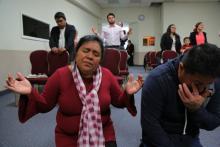On Scripture

Take off your shoes.
No, I really mean it. Right now. Stop what you’re doing. Put down your phone, turn away from your computer screen. Loosen your laces, step out of your sandals, and free your feet from wherever they are currently confined.
Shoes off? Ok, now keep reading.
Take off your shoes, for you are standing on holy ground.

Just like poverty stunted the lives of the people of Jesus’ day, poverty hampers, circumscribes the lives of millions of God’s children in our day. 1 in 2 people living in the United States are poor or low-income; 43 percent of US children live in families that struggle to feed, clothe, and house them. There are 28 million people without health care, 65 million workers who get paid too little to sustain themselves and their families, and a record 14 million (1 in 9) U.S. homes are vacant. 3.5 million people experience homelessness each year and 39 percent of them are children.

The focus of [Jas Singh]'s farm is not production, but invitation — to allow all manner of flesh-and-blood to participate in the mysterious and divine but simple work of God’s kingdom — one where everyone who is fed, and those who typically don’t have the means to provide actually find they have an abundant harvest to share with their neighbor. It is a way to radically engage in leveling the field for all to give, receive, and partake in a way that doesn’t match our unjust economic structures.

Even more difficult than the question of whether or not we are collectively willing to break the law is the question of whether we are ready to embody what a “culture of sanctuary” holistically invites us to be.

The old model was that God created the earth, and human beings were given dominion over it. The earth was a “thing” separate and apart from God. A “thing” to be used by human beings. The new model, and one that makes profound sense to me, is that the earth is the embodiment of the divine presence. It’s not that incarnation happened once and only once in the body of Jesus, but in fact the entire landscape of planet earth is God making incarnate God’s self over and over again.

In essence, we have struggled to understand the work and responsibility of Christian compassion in issues of healthcare and policy. Should this responsibility be shared by all and secured by the government, or should it primarily be the domain of people of faith and those moved by a higher calling to mercy and healing? With the new GOP Health Care Bill, and the ongoing debates about healthcare in America, Christians across the aisle struggle to evaluate how well we are doing at caring for the disenfranchised and the sick.

Power can be transformative, but only if power is suffused with love. As Andy Crouch has written, “Power at its worst is the unmaker of humanity—breeding inhumanity in the hearts of those who wield power, denying and denouncing the humanity of the ones who suffer under power.… Power, the truest servant of love, can also be its most implacable enemy.”

Most often Pentecost comes to us as a momentous Christian occasion of spiritual power, ethnic unity, gender equality, multi-generational comradery, and immigrant hospitality. But when the moment has passed, it gives way to the more ignoble features of life and community, like spiritual apathy, sexism, racial prejudice, ageism, xenophobia, etc.

If we remember the morally injured on this Memorial Day, then perhaps we should also take a moment to critically examine the values that shape our collective ideas about goodness.

I’m not here to argue about whether Paul’s point is a good one — by all accounts, he does a fine job telling the biblical story in a way his gentile listeners can understand. I, like Paul, am a Christ-follower. I’ve already bought what he’s selling. I’m asking about the way he makes his point — I’m pushing back against the notion that Christianity is an idea that can and should be argued in the public square.

Through the Sisters of Salaam Shalom, Jewish and Muslim women are coming together to discover their similarities and bond together as friends and fellow travelers in the world. They are finding common ground, language, or customs to be bridges to relationships. They are not allowing the world to separate them.

I don’t think we like it so much when Jesus is demanding. We like to nice him up, keep him holding up his hand in that beatific way. When Jesus gets demanding, when he acts like the Gospel is demanding, it kind of gets on our nerves.

Hosea 11:1-11, by the force of prophetic imagination, takes us inside the troubled interiority of God. It does not, however, start there. It begins, rather, with an external encounter between God and God’s people, Israel. The poetry is cast in the imagery of “father-son,” with God cast as father and Israel cast as son. (It could as well have been cast as “mother-daughter,” but that would not happen in that ancient patriarchal society). The imagery of “father-son” was operative in Israelite imagination since God’s first declaration, “Israel is my first born son” (Exodus 4:22). Status as first-born son carries with it immense entitlement, but also inescapable responsibility to uphold the honor of the father and the family.

Would we press harder if we thought of our words not as another voice in the fracas but as God’s mandate to justice? The word of the Lord hits Amos as one who is otherwise apt to mind his own business. Those who are compelled to speak should never stop speaking.

Was it Jesus who said, “No greater love has anyone than this, to sit through a school board meeting?”
No, actually that was me. I whispered it to my wife as we sat together for several hours at a recent meeting of our local school board. On the agenda that evening was the adoption of a proposed district-wide gender expansive policy to protect transgendered and gender non-conforming students and bring the district in line with the U.S. Department of Education's directive on Title IX and recent legal precedent.

If we were to go by the titles of books about leadership, we might be tempted to imagine that good leadership is a matter of following the right set of instructions. And this might work if we could all agree what good leadership is. The roiling presidential season just might suggest otherwise.

God’s call of Elijah was an invitation to a beautiful divine/human partnership of faithfulness and faithful service. It was based on a three-point contract: HO-GO-LO.
“HO” indicates that God had to get his attention. It was important for Elijah to know who was calling him, to whom he was accountable, under whose guidance he was to serve and upon whom he could depend for direction, protection, and provisions.

A recent study published by the Pew Research Center offers some interesting data about economic inequality in the United States. In 1982, the top one percent of families took in 10.8 percent of all the pretax income. The bottom 90 percent got 64.7 percent. By 2012, it was 22.5 percent for the top one percent and 49.6 percent for the bottom 90 percent. In a more disturbing trend the top one percent owned 35 of all the personal wealth in 2010. The bottom fifty percent owned just five percent.

Have you ever read scripture from an agrarian perspective? We tend to read scripture with an anthropocentric perspective, but what if we read it with the land and animals in mind first? In her book An Agrarian Approach to Scripture, Ellen Davis invites us to consider reading Scripture with the land and animals at the forefront.

The presidential race has invited all kinds of rash predictions. “If that candidate gets elected, it will be a disaster.” “If that candidate is president, I will move to Canada.” In each case, the prediction of a future disaster is supposed to convince us to act differently in the present. “The election of a certain candidate would be so awful, that we must stop it. Or I’ll move to Canada.” Key parts of our political discourse are predictions of a dire future if a certain candidate is elected.